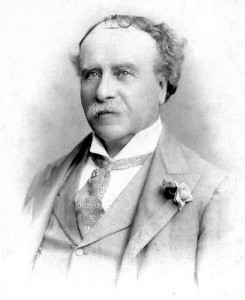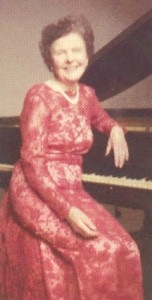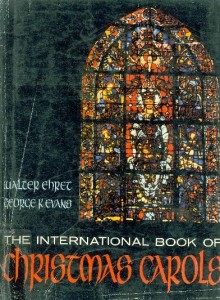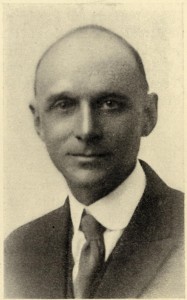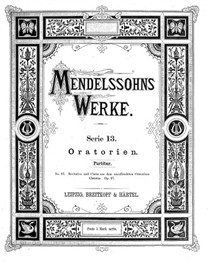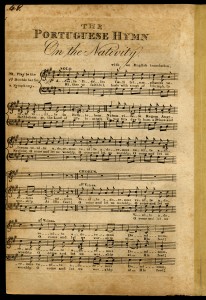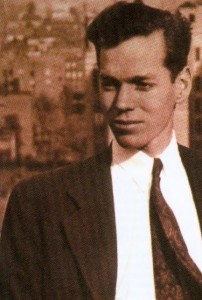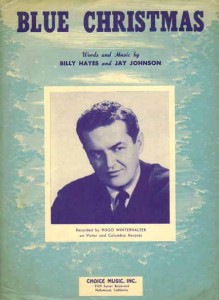Christmas Classics PERSON OF THE DAY: William Hayman Cummings
In August 1831 William Hayman Cummings was born in Sidbury, England. He was a musician, notable tenor, and organist who may be best known for his wedding of Felix Mendelssohn’s music to the Charles Wesley hymn Hark! The Herald Angels Sing. An accomplished musician, Cummings was educated at St. Paul’s Cathedral Choir School and the City of London School. He was also the founder of the Purcell Society, a reputable singing professor at the Royal Academy of Music and later a principal for the Guildhall School of Music.
Wesley, who co-founded the Methodist Church, originally titled his hymn as Hark! How All the Welkin Rings in the 1739 publication Hymns and Sacred Poems. The carol melody was adapted from a cantata that Mendelssohn wrote as part of his commission to compose music for the 1840 Leipzig Gutenberg Festival. That festival commemorated the 400th anniversary of the invention of the printing press by Johann Gutenberg. Six years later the teenage Cummings was a chorister for Mendelssohn’s first London performance of Elijah, the second of three oratorios composed by the German master.
Perhaps during that performance Cummings developed an admiration for Mendelssohn’s music and then in 1855 decided to link Mendelssohn’s music with Charles Wesley’s hymn. Thus on Christmas Day of that year, Hark! The Herald Angels Sing was first sung at Waltham Abbey with William Hayman Cummings at the organ.
Christmas Classics PERSON OF THE DAY: Frances Roots Hadden
In August 1910 the charming composer Frances Roots Hadden was born in Kuling, Lu Shan, China. She was the daughter of Logan Herbert Roots, the Episcopal Bishop of Hankow from 1904 to 1938. When the United States and China renewed diplomatic ties in 1972, Chou En-Lai, the Chinese premier, invited Frances and her husband, Richard, as his personal guests to perform a duet piano concert. That was the first performance by an American musician in the Republic of China since 1949, the year of the Communist takeover.
The Haddens’ duet piano concert included the Lu Shan Suite, composed by Frances in 1966. The suite melody was in fact based upon a work-song chant of stone carriers of the sacred and idyllic Lu-shan Mountain located in central China. Frances had often heard that tune as a child, which she also incorporated in her lovely carol A Chinese Christmas Cradle Song.
The tender lyrics of A Chinese Christmas Cradle Song are based on an anonymous 2nd century Chinese poem and were first printed in the The Second Treasury of Christmas Music (Emerson Books, New York, 1968). Also known as Shiao Bao-Bao, a term in Chinese meaning “Little Precious,” an endearing description for the baby Jesus, the enchanting carol belongs in every Christmas music library.
For those unfamiliar with Hadden’s truly remarkable piece, and if you are looking to expand your Christmas music horizons, I strongly suggest getting your hands on the album (if available) A Christmas Cantata by the Cardiff Polyphonic Choir & Orchestra with Richard Elfyn Jones conducting. It is one of the few places you will find the recording.
On a personal note, I had the privilege of speaking with Frances and her husband before her passing in 2000. They were both generous souls, and Frances was thrilled to learn about my research on carols and that I admired her carol so much.
Christmas Classics PERSON OF THE DAY: Doug Anderson
On this day in 1950, Doug Anderson was born in Eugene, Oregon. He is best known as the author of A Treasury of Christmas Carols: The Hymns and Carols of Christmas and its corresponding website. He is one of the foremost authorities on the history of Christmas carols and hymns on the Internet.
How he came to be such a distinguished authority can be trace to nurturing parents, degrees in Journalism and Law, a stint at the Jesuit Novitiate, Oregon Province in 1972-1973, and his marriage to Vicki Sue Paulson on April 28, 1991.
Anderson’s career in law was primarily as a criminal defense attorney and judge before retiring in 1984. He then served as a member of the Oregon Army National Guard from 1984-2007 and became Assistant Inspector General with the rank of Master Sergeant.
In August 2005 Anderson mysteriously became ill with daily migraine headaches. Today they are so serious that he is confined to 20-22 hours of bed rest a day. He has also had to survive an apparent heart attack and two bouts of the deadly Legionnaire’s Disease.
Despite these physical setbacks and on-going illness, Anderson has faithfully maintained his web site TheHymnsandCarolsofChristmas.com, the genesis of which began in 1996 when he played guitar in a bluegrass trio that put on a Christmas concert for a local Veterans Administration nursing home.
TheHymnsandCarolsofChristmas.com is an exhaustive and fantastic collection of over 3,600 (and still counting) carols and hymns, the largest such international collection of carols and hymns on the Internet. It was formatted after his 1996 title A Treasury of Christmas Carols: The Hymns and Carols of Christmas.
The intrepid Anderson is also the author of eight books on religious topics, including three works devoted to the subject of prayer, plus his annual Devotions for Advent. Five titles were inspired by the great religious reformer, Martin Luther. He has also edited, or compiled, twelve collections of Christmas poetry, notably those of Christina Rossetti, Catherine Winkworth, and Robert Herrick. Several new books are in the offing, including Luther’s Advent, Christmas & Epiphany Sermons, plus an updated version of the Devotions for the Advent.
After his retirement from the military in 2007, Doug and wife Vicki Sue moved to Decatur, Alabama. There he got licensed as an amateur radio operator and watches the weather as a National Weather Service SKYWARN volunteer. In keeping with his religious nature, he is a member of St. Paul’s Lutheran Church where he served as a Pastoral Assistant for Prayer and Liturgy until early 2010 when illness prevented him from continuing those ministries.
Doug Anderson’s contributions to the preservation of Christmas carols are unparalleled in today’s hyper-speed world and the Internet. He rightfully belongs to the cathedral of famous carol collectors, editors, and compilers from Theodore Petri, William Sandys, Sir John Stainer, Percy Dearmer, George K. Evans, and William Studwell.
Whether you have little or great interest in the history and preservation of Christmas carol and hymns, especially those of a religious color, I strongly encourage you to go to Doug’s web site TheHymnsandCarolsofChristmas.com. Despite Doug’ physical condition, he has continued to do thorough research and add new content about Christmas carols and hymns. As a result of this consistent effort, any site visitor will have available to his or herself unique and informative content unlike any found on the Internet.
To sum up what drives Doug today, it can be best expressed in his own words: “I’ve found that if we want to do good, we’d best not wait until tomorrow, for tomorrow may never come.” He further quotes from Horace, Odes: “Even while we speak, Time, the churl, will have been running. Snatch the sleeve of today and trust as little as you may to tomorrow.”
To that I must add, “From him who has endured so much, much has been given.”
Christmas Classics PERSON OF THE DAY: George K. Evans
On this day in 1917, George K. Evans was born in Arkansas. He is most noted as a translator and co-author of the highly respected The International Book of Christmas Carols published by Prentice-Hall in 1963 and reprinted in 1980 by S. Greene Press.
Evans was responsible, along with colleague Walter Ehret, for including in The International Book of Christmas Carols many carols theretofore never published in English collections, especially Slavic, Scandinavian, and Spanish carols. Evans himself provided the notes and translations for most of the carols, as well as for the popular German carol O Tannenbaum. In addition he wrote a fine seven page introduction to the book.
Fifteen years ago I spoke with the retired co-author about The International Book of Christmas Carols. He was quite proud of his contributions, and rightfully so I told him, but expressed disappointment that the book wasn’t more aggressively marketed. When I hinted that most carol books generally do not have large print runs, Evans ever the gentleman concurred. When I further commented that I thought his oeuvre d’ hors was one of the finest 20th century carol collections, he was greatly pleased for the attention.
George K. Evans died at his home in North Hollywood, California in 2003. He will always be remembered and honored here as a significant contributor to the international Christmas music repertoire.
Christmas Classics PERSON OF THE DAY: Edward Bliss Reed
On this day in 1872, Edward Bliss Reed was born in New York.He was an esteemed professor at Yale University as well as eminent translator and propagator of Christmas carols. From 1924 to 1947, primarily during Reed’s editorial stewardship, the Carol Society of New Haven, Connecticut published nineteen high quality carol collections. Most collections contained eight carols from European countries, some of which were relatively unknown and theretofore unpublished. Although only a limited number of volumes were printed, I had the good fortune to find some of them on the well-organized shelves of the University of Pennsylvania Van Pelt Library.
The Yale scholar engaged himself in many literary pursuits during his career, but he seemed particularly motivated by his love of Christmas carols. Besides being a major contributor to the revival of medieval songs of Europe, Reed consistently researched, translated, and published carols, such as Christmas Carols Printed in the Sixteenth Century (1932), in addition to editing the collections of the Carol Society.
For most years from 1913 until his death in 1940, Reed took great delight in arranging the annual Phi Beta Kappa Christmas carols concerts at Yale’s Battell Chapel. His passing, though predating the last of the Carol Society publications, was a great loss and for all extensive purposes led to the Carol Society closing its door.
Christmas Classics PERSON OF THE DAY: William Bartholomew
On this day in 1867, William Bartholomew died. He was noted for his English translations of many of Felix Mendelssohn’s German works, including Christus, an unfinished but superb oratorio.
A chemist by trade, as well as a painter, Bartholomew decided in 1822 to exclusively devote his time to writing lyrical versions of foreign texts. Mendelssohn much admired Bartholomew and his translating skills, and together they collaborated when the German master’s works were introduced in England, among which was the 1846 premiere of Mendelssohn’s more famous oratorio Elijah.
Bartholomew was also a composer of hymns, children’s songs, and produced his own oratorio titled The Nativity. The latter may have been influenced by the lamentable early death of Mendelssohn in 1847.
Two of the more remarkable fragments of Christus, a title given posthumously by Mendelssohn’s brother, Paul, and translated by William Bartholomew, related to the Nativity of Christ. They were the tenor recitative “Where is the Newborn” and the choral recitative “There Shall a Star from Jacob Come Forth.”
For those who have never heard the unfinished Christus, you should treat yourself and check it out this Christmas. You will learn why Mendelssohn, knowing death was near, wanted to husband his energy as best he could to finished these beautiful and moving recitatives. Bartholomew knew firsthand the brilliance of Mendelssohn’s last opus.
Christmas Classics PERSON OF THE DAY: John Francis Wade
On this day in 1786, John Francis Wade died in Douai, France. He may be best known as the author of the reverential carol-hymn Adeste Fidelis (O Come All Ye Faithful). A Catholic laymen, Wade was forced to leave England for Duoai, France during the 1745 Jacobean rebellion because of continued persecution of Catholics.
Duoai was a medieval fortress town with a English college that was founded to combat the errors associated with the Reformation. English Catholics were welcomed there since the reign of Elizabeth I. The college curriculum was religious in scope, especially suited for the education of Catholic clergy, and for which the preservation of Catholicism in England was a prime objective. It also was an ideal haven for Wade since he taught music for children and copied plainchant (Gregorian chant) and hymn manuscripts for private use.
But Wade’s miniature masterpiece Adeste Fideles was composed sometime between 1740 and 1743. The Latin lyrics were published in 1760 in Evening Offices of the Church, and the melody and lyrics were printed together in An Essay on the Church Plain Chant (London, 1782).
In 1852 the Rev. Frederick Oakeley, an English clergyman who became a convert to the Roman Catholic Church, saw his English translation O Come All Ye Faithful of Wade’s hymn published, although he had translated the Latin text eleven years earlier. A William Thomas Brooke may have also had a hand translating some of the hymns verses.
Adeste Fideles has also been referred to as The Portuguese Hymn, because it was believed for a time to have been first sung by the famous choir of the Portuguese Chapel in London. This would not have been an unlikely scenario, as Wade was known to have corresponded with prominent Catholic musicians of the foreign embassy chapels there, including Thomas Arne, the highly respected English composer.
John Francis Wade is believed to have died in Duoai. His obituary read: Mr. John Francis Wade, a Layman, aged 75, with whose beautiful Manuscript Books our Chapels as well as private Families abound, in writing which, and teaching the Latin and Church Song he chiefly spent.
To which it should be added: Amen!
Christmas Classics PERSON OF THE DAY: Bobby Helms
On this day in 1933, Robert Lee Helms was born in Bloomington, Indiana. Better known as Bobby Helms, he was a country singer and the original recording artist of Jingle-Bell Rock, the first Christmas holiday song noted for its rock n’ roll flavor. It was released by Decca Records on December 23, 1957, a hundred years after the copyright of Jingle Bells, which may not have been totally coincidental. The song rapidly rose to #6 on the Pop Charts and has since been reprised every Christmas season.
Bobby Helms rise to stardom actually began earlier that year with the release of Fraulein, a country song, which to the surprise of country aficionados, fared well on the pop charts, and later in 1957 with My Special Angel, Helms’ biggest hit that sold over a million records.
Jingle-Bell Rock, however, was the brainchild of an very unlikely pair of the songwriters: Joseph Carleton Beal, a public relations man and author, and Texas-born James R. Boothe whose career was largely devoted to advertising. Jingle-Bell Rock was their sole claim to fame in the world of Christmas music.
Although Bobby Helms continued a productive career in country music that included touring with his Bobby Helms Show and promoting a yearly musical festival in his native Indiana, not to mention he owned three night clubs, he never again achieved the soaring heights when Jingle-Bell Rock topped off what was a very, very good year.
Christmas Classics PERSON OF THE DAY: Hugh Martin
On this day in 1914, Hugh Martin was born in Birmingham, Alabama. He was a composer for both the Broadway stage and films and is credited for co-writing along with his long-time collaborator, Ralph Blane, the popular holiday classic Have Yourself a Merry Little Christmas, as well the other songs for the Hollywood musical Meet Me in St. Louis starring Judy Garland. Martin and Blane did indeed collaborate on a number of Broadway musicals for several decades. In his autobiography, however, Martin claimed he was solely responsible for the music and lyrics of Have Yourself a Merry Little Christmas.
Martin wrote the song’s first draft while vacationing at a Birmingham house his father designed for his mother. That draft was judged too depressing by Judy Garland, her co-star Tom Drake, and Vincente Minnelli, the movie director and future husband of Garland. The dispirited Martin was reluctant to change the lyrics, but then went about the task of revising them to accommodate his initial critics. What resulted was a more upbeat, though wistful, tune that Garland eventually sang in the musical and later as a single for Decca Records. Her sentimental version was known to have caused many a tearful eye, especially among U.S. troops serving in World War II.
Over the years some of the original verse lines of Have Yourself a Merry Little Christmas were further changed. For Frank Sinatra and his 1957 album A Jolly Christmas, Martin revised the original line “Until then we’ll have to muddle through somehow” to the more familiar and popular phrase “Hang a shining star upon the highest bough.” In later years the line “through the years, we all will be together if the Lord allows,” was replaced by the less religious “if the fates allow.”
Hugh Martin died of natural causes on March 11, 2011 at his home in Encinitas, California. At his bedside were his niece Suzanne Hanners, and Elaine Harrison his long-time manager and best friend.
Christmas Classics PERSON OF THE DAY: Billy Hayes III
On August 12, 1993, Billy Hayes III died in his home town of Brooklyn, New York. The songwriter, guitarist, and nightclub performer is best known for his collaboration with his friend Jay W. Johnson to compose Blue Christmas. It was Johnson, a script and jingle writer for radio, who came up with the song idea in 1948 on one of his daily commute rides to New York. Hayes helped to put the finishing touches to the song before it was presented to Choice Music Co., which soon released the first recording of Blue Christmas.
In 1949 Blue Christmas was recorded by three different artists: two by big band leaders, Russ Morgan and Hugo Winterhalter, and the third by Ernest Tubb, the popular country singer. Tubb’s version became most popular in 1950, but his rendition was ultimately eclipse in popularity in 1957 when Elvis Presley included the country genre Christmas song in his Christmas album. In 1964 Elvis recorded it as a single and since then it has become an annual Christmas standard.
Although Billy Hayes is credited with a number of other songs, such as Play Fair, Yesterday’s Kisses, Tomorrow’s Just Another Day to Cry, Got a Ring Around Rosie’s Finger, and Who Shot the Hole in My Sombrero, his claim to fame is mostly tied to his signature song – Blue Christmas.
